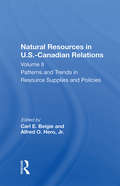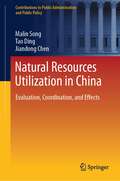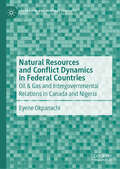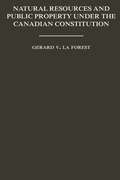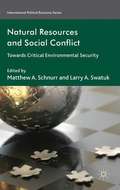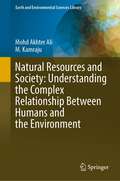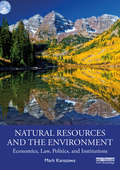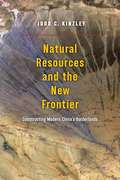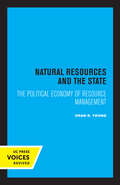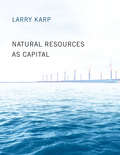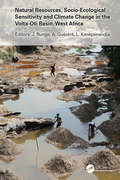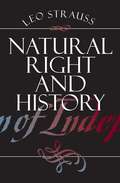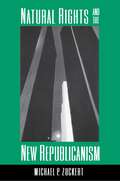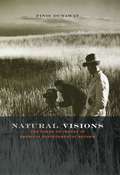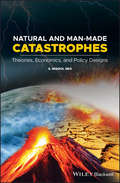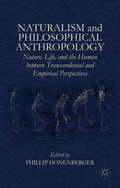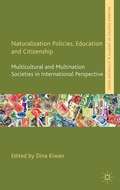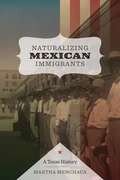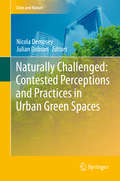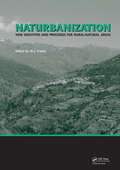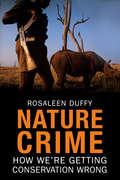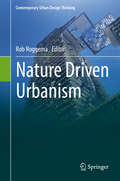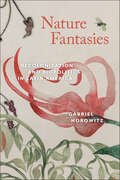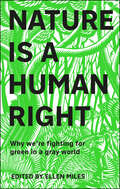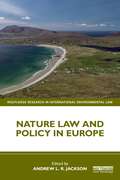- Table View
- List View
Natural Resources In U.s.-canadian Relations, Volume 2: Patterns And Trends In Resource Supplies And Policies
by Carl E. BeigieThe combined efforts of the World Peace Foundation, the G. D. Howe Research Institute, and the Centre Quebecois de Relations Internationales have culminated in a comprehensive three-volume study of critical U.S.-Canadian resource issues. Motivated initially by the tensions of the mid-1970s and by immediate U.S. concerns about the actions of its maj
Natural Resources Utilization in China: Evaluation, Coordination, and Effects (Contributions to Public Administration and Public Policy)
by Tao Ding Malin Song Jiandong ChenThis book focuses on the evaluation, coordination, and effects of China’s natural resource utilization. By adopting both quantitative and qualitative analyses, this book objectively evaluates the spatial distribution characteristics and coupling relationship of China’s natural resource utilization based on the status quo and prominent problems during resource utilization. Moreover, the environmental, economic, and price fluctuation effects of China’s natural resource utilization are discussed. Finally, current policy systems for efficient utilization of natural resources in China and abroad are provided, which suggest a way for China to achieve efficient utilization of natural resources through an appropriate policy mechanism. This book aims to seek the balance the utilization of natural resources and sustainable development in China. It puts forward a new paradigm of natural resource utilization by incorporating the efficiency evaluation, coordination measures, and effect mechanisms of different kinds of natural resources. The evaluation system and related research methods for the efficient utilization of natural resources are very mature, laying a foundation for the development of this book’s content. As the conservation of natural resources is widely accepted, this book helps readers understand how to achieve efficient natural resource utilization in China. Meanwhile, the study of resource utilization in China can provide insights for other countries.
Natural Resources and Conflict Dynamics in Federal Countries: Oil & Gas and Intergovernmental Relations in Canada and Nigeria (Federalism and Internal Conflicts)
by Eyene OkpanachiThis book examines the dynamics of oil and gas conflicts within the context of federalism in Canada, an older federation with broadly a decentralized institutional design governing oil and gas, and Nigeria, a newer federation with a largely centralized design. It traces resource ownership, control or regulation, and revenue sharing conflict processes over time, and provides a focused comparison of conflict over the role of oil in intergovernmental fiscal transfers in both countries. In so doing, the book provides a much-needed corrective to conventional, static notions of oil conflict as either violent or nonviolent outcomes by carefully analyzing the evolution and ebbs and flows of conflicts hidden within conflict patterns that appear to be self-reinforcing and entrenched. The book demonstrates that (de)centralization dynamics, especially the continuities and shifts in federal institutional (structural and ideational) rules about oil itself,are central to the concept of conflict dynamics. It highlights the endogenous processes of federal institutional development, and lends credence to the historical institutionalists’ emphasis on the entanglement of institutions in their own transformation. Yet, the book also reveals that conflict dynamics did not emerge solely from the initial "compromise" between federal and provincial/state actors regarding the allocation of competence over oil. The renegotiation and reinterpretation of these rules over time, which entails a redistribution of power/resources in response to historical temporalities and shocks, political agency, and changing socioeconomic realities, also generated unique patterns of conflict and conflict resolution within the federal institutional arenas.
Natural Resources and Public Property Under the Canadian Constitution (The Royal Society of Canada Special Publications)
by Gerard La ForestThe controversy aroused by the Supreme Court's decision on offshore mineral rights emphsizes the importance of the public domain in the workings of the Canadian constitution. Public property is important to the provinces not only for its revenues, but also because it provides them with a powerful instrument for control of their economic and political destinies and strengthens their position in relation to federal authorities. The provisions of the British North America Act and other constitutional instruments relating to natural resources and public property are examined thoroughly in this series of lectures given to doctoral systems at the Faulte de droit of the Universite de Montreal. Professor La Forest studies ownership of mines and minerals, navigable waters, public harbours, fisheries and Indian lands, as well as the currently controversial offshore mineral rights. He notes the political imlications of the partition of proprietary rights and explores the areas of conflict between the federal and provincial governments. Also included is a discussion of the power of expropriation, and, because public property involves public monies, lending and spending powers receive attention.In these lectures, Professor La Forest traces public domain in Britain from the time when the monarch controlled all the land, to his surrender of this control to parliament in return for a civil list, and to the similar surrender to the legislatures of the British North American colonies in connection with the struggle of responsible government.The collection of lectures is essential reading for any serious student of the constitution and will be very useful to all who are interested in the increasingly important law of natural resources in Canada.
Natural Resources and Social Conflict
by Matthew A. SchnurrThis volume brings together international scholars reflecting on the theory and practice of international security, human security, natural resources and environmental change. It contributes by 'centring the margins' and privileging alternative conceptions and understandings of environmental (in)security.
Natural Resources and Society: Understanding the Complex Relationship Between Humans and the Environment (Earth and Environmental Sciences Library)
by Mohd Akhter Ali M. Kamraju"Natural Resources and Society: Understanding the Complex Relationship Between Humans and the Environment" is a study of the dynamic interplay between humans and the natural world. The book explores the complex relationship between human societies and the environment, examining how human actions can both impact and be influenced by natural resources.The book covers a broad range of topics, including the history of human resource use, the role of natural resources in economic development, and the environmental impacts of resource extraction and consumption. It also considers the social and cultural factors that shape human interactions with the natural world, and the challenges of sustainable resource management. Overall, the book provides a comprehensive overview of the relationship between humans and the environment, emphasizing the importance of understanding this relationship in order to develop more sustainable and equitable societies.
Natural Resources and the Environment: Economics, Law, Politics, and Institutions
by Mark KanazawaNatural Resources and the Environment: Economics, Law, Politics, and Institutions provides a new approach to the study of environmental and natural resource economics. It augments current contributions from the fields of public choice, law, and economics, and the burgeoning field of what used to be called the "New Institutional Economics," to describe, explain, and interpret how these new developments have been applied to better understand the economics of natural resources and the environment. This textbook takes a multi-disciplinary approach, which is essential for understanding complex environmental problems, and examines the issue from not only an economic perspective, but also taking into account law, politics, and institutions. In doing so, it provides students with a realistic understanding of how environmental policy is created and presents a comprehensive examination of real-world environmental policy. The book provides a comprehensive coverage of key issues, including renewable energy, climate change, agriculture, water resources, land conservation, and fisheries, with each chapter accompanied by learning resources, such as recommended further reading, discussion questions, and exercises. This textbook is essential reading for students and scholars seeking to build an interdisciplinary understanding of natural resources and the environment.
Natural Resources and the New Frontier: Constructing Modern China's Borderlands
by Judd C. KinzleyChina’s westernmost province of Xinjiang has experienced escalating cycles of violence, interethnic strife, and state repression since the 1990s. In their search for the roots of these growing tensions, scholars have tended to focus on ethnic clashes and political disputes. In Natural Resources and the New Frontier, historian Judd C. Kinzley takes a different approach—one that works from the ground up to explore the infrastructural and material foundation of state power in the region. As Kinzley argues, Xinjiang’s role in producing various natural resources for regional powers has been an important but largely overlooked factor in fueling unrest. He carefully traces the buildup to this unstable situation over the course of the twentieth century by focusing on the shifting priorities of Chinese, Soviet, and provincial officials regarding the production of various resources, including gold, furs, and oil among others. Through his archival work, Kinzley offers a new way of viewing Xinjiang that will shape the conversation about this important region and offer a model for understanding the development of other frontier zones in China as well as across the global south.
Natural Resources and the State: The Political Economy of Resource Management
by Oran R. YoungThis title is part of UC Press's Voices Revived program, which commemorates University of California Press’s mission to seek out and cultivate the brightest minds and give them voice, reach, and impact. Drawing on a backlist dating to 1893, Voices Revived makes high-quality, peer-reviewed scholarship accessible once again using print-on-demand technology. This title was originally published in 1981.
Natural Resources as Capital (The\mit Press Ser.)
by Larry KarpAn introduction to the concepts and tools of natural resource economics, including dynamic models, market failures, and institutional remedies.This introduction to natural resource economics treats resources as a type of capital; their management is an investment problem requiring forward-looking behavior within a dynamic setting. Market failures are widespread, often associated with incomplete or nonexistent property rights, complicated by policy failures. The book covers standard resource economics topics, including both the Hotelling model for nonrenewable resources and models for renewable resources. The book also includes some topics in environmental economics that overlap with natural resource economics, including climate change.The text emphasizes skills and intuition needed to think about dynamic models and institutional remedies in the presence of both market and policy failures. It presents the nuts and bolts of resource economics as applied to nonrenewable resources, including the two-period model, stock-dependent costs, and resource scarcity. The chapters on renewable resources cover such topics as property rights as an alternative to regulation, the growth function, steady states, and maximum sustainable yield, using fisheries as a concrete setting. Other, less standard, topics covered include microeconomic issues such as arbitrage and the use of discounting; policy problems including the “Green Paradox”; foundations for policy analysis when market failures are important; and taxation. Appendixes offer reviews of the relevant mathematics. The book is suitable for use by upper-level undergraduates or, with the appendixes, masters-level courses.
Natural Resources, Socio-Ecological Sensitivity and Climate Change in the Volta-Oti Basin, West Africa
by Jürgen RungeThis book presents the outcome of an interdisciplinary and international workshop supported by the Volkswagen Stiftung (funding line ‘Knowledge for Tomorrow’) on the topic of ‘Natural Resources, Socio-Ecological Sensitivity and Climate Change in the Volta-Oti Basin, West Africa’. The conference was jointly organised by Goethe-University Frankfurt (Germany) and the University of Kara (Togo) held from March 6 to 8, 2019 in northern Togo. It aimed to strengthen capacities of junior scientists from the sub-region, exchange and mobilise theoretical and methodological background from various scientific fields (Botany, Construction, Geology, Geography, Infrastructure, Politics, Remote Sensing, Sociology and Urban Planning). One goal was to deliver reliable elements for ongoing and profound environmental analyses that lie outside the common questions of the academic and civil society stakeholders. Ecosystem fragmentation and deforestation in West Africa are mainly triggered by humans such as agriculture and small-scale forest disturbances for charcoal and firewood production. Increasing population pressure, declining of carrying capacity and demand for agricultural land caused the reduction of land conservation capacities, even in protected areas. The complexity of interactions between environmental and socio-ecological systems and subsequent effects (sensitivity) has raised ongoing international awareness in light of ongoing climate change. By the example of natural resources, land use and stakeholders’ perceptions within the Volta-Oti Basin the book’s proceedings present, discuss and distribute new findings that will sustainably stimulate the international debate. The workshop also intended to overcome national borders and language barriers between the Anglophone (Ghana) and the Francophone (Benin, Burkina Faso, Ivory Coast, Togo) research communities, and supported better West African cooperation and networking. The young as well as the established partners formed new collaborations, and the event at the University of Kara (Togo) was a truly unique opportunity for all involved, not only to discuss science, but also to assess applied and best future management practices for the Oti-Volta Basin in West Africa.
Natural Right and History: Lectures And Essays By Leo Strauss, 1937-1946 (Walgreen Foundation Lectures)
by Leo StraussIn this classic work, Leo Strauss examines the problem of natural right and argues that there is a firm foundation in reality for the distinction between right and wrong in ethics and politics. On the centenary of Strauss's birth, and the fiftieth anniversary of the Walgreen Lectures which spawned the work, Natural Right and History remains as controversial and essential as ever. "Strauss . . . makes a significant contribution towards an understanding of the intellectual crisis in which we find ourselves . . . [and] brings to his task an admirable scholarship and a brilliant, incisive mind."—John H. Hallowell, American Political Science Review Leo Strauss (1899-1973) was the Robert Maynard Hutchins Distinguished Service Professor Emeritus in Political Science at the University of Chicago.
Natural Rights and the New Republicanism
by Michael P. ZuckertIn Natural Rights and the New Republicanism, Michael Zuckert proposes a new view of the political philosophy that lay behind the founding of the United States. In a book that will interest political scientists, historians, and philosophers, Zuckert looks at the Whig or opposition tradition as it developed in England. He argues that there were, in fact, three opposition traditions: Protestant, Grotian, and Lockean. Before the English Civil War the opposition was inspired by the effort to find the "one true Protestant politics--an effort that was seen to be a failure by the end of the Interregnum period. The Restoration saw the emergence of the Whigs, who sought a way to ground politics free from the sectarian theological-scriptural conflicts of the previous period. The Whigs were particularly influenced by the Dutch natural law philosopher Hugo Grotius. However, as Zuckert shows, by the mid-eighteenth century John Locke had replaced Grotius as the philosopher of the Whigs. Zuckert's analysis concludes with a penetrating examination of John Trenchard and Thomas Gordon, the English "Cato," who, he argues, brought together Lockean political philosophy and pre-existing Whig political science into a new and powerful synthesis. Although it has been misleadingly presented as a separate "classical republican" tradition in recent scholarly discussions, it is this "new republicanism" that served as the philosophical point of departure for the founders of the American republic.
Natural Visions: The Power of Images in American Environmental Reform
by Finis DunawayWalden Pond. The Grand Canyon.Yosemite National Park. Throughout the twentieth century, photographers and filmmakers created unforgettable images of these and other American natural treasures. Many of these images, including the work of Ansel Adams, continue to occupy a prominent place in the American imagination. Making these representations, though, was more than a purely aesthetic project. In fact, portraying majestic scenes and threatened places galvanized concern for the environment and its protection. Natural Visions documents through images the history of environmental reform from the Progressive era to the first Earth Day celebration in 1970, showing the crucial role the camera played in the development of the conservation movement. In Natural Visions, Finis Dunaway tells the story of how visual imagery—such as wilderness photographs, New Deal documentary films, and Sierra Club coffee-table books—shaped modern perceptions of the natural world. By examining the relationship between the camera and environmental politics through detailed studies of key artists and activists, Dunaway captures the emotional and spiritual meaning that became associated with the American landscape. Throughout the book, he reveals how photographers and filmmakers adapted longstanding traditions in American culture—the Puritan jeremiad, the romantic sublime, and the frontier myth—to literally picture nature as a place of grace for the individual and the nation. Beautifully illustrated with photographs by Ansel Adams, Eliot Porter, and a host of other artists, Natural Visions will appeal to a wide range of readers interested in American cultural history, the visual arts, and environmentalism.
Natural and Man-Made Catastrophes: Theories, Economics, and Policy Designs
by S. Niggol SeoA thorough explanation of the mathematical theories, philosophies, and economics of catastrophes with a view to how humanity should be prepared for events with catastrophic consequences This book presents a holistic view of natural and man-made catastrophes, from mathematical theories and philosophy through to economics and policy. It is both academic and applied in its approach, offering both empirical evidence and academic reflections to give a new perspective on an ever-developing topic, and providing many examples of public policy and catastrophe responses from around the world. Natural and Man-made Catastrophes: Theories, Economics, and Policy Designs begins by introducing readers to numerous natural and man-made catastrophes and how catastrophe theories have played a pivotal role in designing policies and responses to them. It discusses hurricanes, earthquakes, nuclear disaster, asteroid collision, Large Hadron Collider, artificial intelligence, uncontrollable robots, global warming, infectious diseases without antibodies, and bioterrorism. It clarifies key mathematical and scientific theories—such as catastrophe theory, chaos, singularity, fractal, tipping point, unbounded variance, fat-tail, and Feigenbaum constant—on catastrophes. The book goes on to examine ancient and contemporary philosophies that have played critical roles in humanity’s understanding of catastrophic outcomes. The book critically builds the economics of catastrophic events 1) by consolidating the catastrophe literature in natural sciences, scientific theories, and philosophy; 2) by constructing global empirical catastrophe data and analytical models using historical data on hurricanes and earthquakes; 3) and by critically reviewing policy experiences on the aforementioned catastrophic events. Lays the foundation for the economic analyses and policy-making on potential humanity/universe threatening catastrophes Includes many examples of public policy and behavioral responses to catastrophes from around the world Provides a wide-ranging commentary on crucial implications of the studies, models, and concepts of catastrophes Synthesizes the catastrophe literature in mathematical theories, philosophical traditions, economic analyses, policy studies, and contemporary concerns. Natural and Man-made Catastrophes: Theories, Economics, and Policy Designs is an important book for students, teachers, professionals, and policy makers who are involved in environmental research and disaster response.
Naturalism and Philosophical Anthropology: Nature, Life, and the Human between Transcendental and Empirical Perspectives
by Phillip HonenbergerWhat is a human being? Philosophical anthropology has approached this question with unusual sophistication, experimentalism, and subtlety. This volume explores the philosophical anthropologies of Scheler, Gehlen, Plessner, and Blumenberg in terms of their relevance to contemporary theories of nature, naturalism, organic life, and human affairs.
Naturalization Policies, Education and Citizenship
by Dina KiwanAround the world, there is a heightened interest in citizenship policy in the policy domains of education, naturalization and integration. We are witnessing widespread contestations over conceptions of citizenship whether it be, for example, the challenges posed by multicultural diversity as a result of large-scale immigration in Western contexts, or the challenges of ongoing uprisings in the Arab world, as seen through the lens of the 'Arab Spring'. This book examines 'national' constructions of citizenship through its study of education and naturalization policies, uniquely drawing on a wide range of country examples - including Belgium, Denmark, France, Germany, the UK, Ukraine, Canada and Palestinians in Lebanon. Contributing authors examine 'national' constructions of citizenship in a wide range of societal contexts, including devolution, multiculturalism, ethno-religious conflict, post conflict and 'non-state' refugees. "
Naturalizing Mexican Immigrants
by Martha MenchacaDuring the nineteenth and early twentieth centuries, a majority of the Mexican immigrant population in the United States resided in Texas, making the state a flashpoint in debates over whether to deny naturalization rights. As Texas federal courts grappled with the issue, policies pertaining to Mexican immigrants came to reflect evolving political ideologies on both sides of the border. Drawing on unprecedented historical analysis of state archives, U. S. Congressional records, and other sources of overlooked data, Naturalizing Mexican Immigrants provides a rich understanding of the realities and rhetoric that have led to present-day immigration controversies. Martha Menchaca's groundbreaking research examines such facets as U. S. -Mexico relations following the U. S. Civil War and the schisms created by Mexican abolitionists; the anti-immigration stance that marked many suffragist appeals; the effects of the Spanish American War; distinctions made for mestizo, Afromexicano, and Native American populations; the erosion of means for U. S. citizens to legalize their relatives; and the ways in which U. S. corporations have caused the political conditions that stimulated emigration from Mexico. The first historical study of its kind, Naturalizing Mexican Immigrants delivers a clear-eyed view of provocative issues.
Naturally Challenged: Contested Perceptions and Practices in Urban Green Spaces (Cities and Nature)
by Nicola Dempsey Julian DobsonThis book aims to understand how the wellbeing benefits of urban green space (UGS) are analysed and valued and why they are interpreted and translated into action or inaction, into ‘success’ and/or ‘failure’. The provision, care and use of natural landscapes in urban settings (e.g. parks, woodland, nature reserves, riverbanks) are under-researched in academia and under-resourced in practice. Our growing knowledge of the benefits of natural urban spaces for wellbeing contrasts with asset management approaches in practice that view public green spaces as liabilities. Why is there a mismatch between what we know about urban green space and what we do in practice? What makes some UGS more ‘successful’ than others? And who decides on this measure of ‘success’ and how is this constituted? This book sets out to answer these and related questions by exploring a range of approaches to designing, planning and managing different natural landscapes in urban settings.
Naturbanization: New identities and processes for rural-natural areas
by M. J. PradosAs the growth of the worlds population requires the continued search for residential space, the urbanization of natural lands is an inevitable process, but that process does not have to be one that is accomplished without regard for environmental quality. This book presents the unique perspective of naturbanization, the urbanization of protected a
Nature Crime
by Rosaleen DuffyIn this impressively researched, alarming book, Rosaleen Duffy investigates the world of nature conservation, arguing that the West's attitude to endangered wildlife is shallow, self-contradictory, and ultimately very damaging. Analyzing the workings of the black-market wildlife industry, Duffy points out that illegal trading is often the direct result of Western consumer desires, from coltan for cellular phones to exotic meats sold in London street markets. She looks at the role of ecotourism, showing how Western travelers contribute--often unwittingly--to the destruction of natural environments. Most strikingly, she argues that the imperatives of Western-style conservation often result in serious injustice to local people, who are branded as "problems" and subject to severe restrictions on their way of life and even extrajudicial killings.
Nature Driven Urbanism (Contemporary Urban Design Thinking)
by Rob RoggemaThis book discusses the way that a nature-driven approach to urbanism can be applied at each of the urban scales; architectural design, urban design of neighborhoods, city planning and landscape architecture, and at the city and regional scales. At all levels nature-driven approaches to design and planning add to the quality of the built structure and furthermore to the quality of life experienced by people living in these environments. To include nature and greening to built structures is a good starting point and can add much value. The chapter authors have fiducia in giving nature a fundamental role as an integrated network in city design, or to make nature the entrance point of the design process, and base the design on the needs and qualities of nature itself. The highest existence of nature is a permanent ecosystem which endures stressors and circumstances for a prolonged period. In an urban context this is not always possible and temporality is an interesting concept explored when nature is not a permanent feature. The ecological contribution to the environment, and indirect dispersion of species, from a temporary location will, overall add biodiversity to the entire system.
Nature Fantasies: Decolonization and Biopolitics in Latin America (Bucknell Studies in Latin American Literature and Theory)
by Gabriel HorowitzIn this original study, Gabriel Horowitz examines the work of select nineteenth- and twentieth-century Latin American writers through the lens of contemporary theoretical debates about nature, postcoloniality, and national identity. In the work of José Martí, Gertrudis Gómez de Avellaneda, Jorge Luis Borges, Augusto Roa Bastos, Cesar Aira, and others, he traces historical constructions of nature in regional intellectual traditions and texts as they inform political culture on the broader global stage. By investigating national literary discourses from Cuba, Argentina, and Paraguay, he identifies a common narrative thread that imagines the utopian wilderness of the New World as a symbolic site of independence from Spain. In these texts, Horowitz argues, an expressed desire to return to the nation’s foundational nature contributed to a movement away from political and social engagement and toward a “biopolitical state,” in which nature, traditionally seen as pre-political, conversely becomes its center.
Nature Is A Human Right: Why We're Fighting for Green in a Gray World
by Ellen MilesFighting for a green world — a collection of essays and writing for building an equal, healthier society. Access to the natural world is a human right. This inspiring book captures why contact with nature is essential for our mental, social and physical well-being — and how we can rethink urban development to create green city spaces and a return to nature.Find an inspiring collection of original writings from world-leading &“green&” voices and discover: • Benefits and issues surrounding our access to nature • Discussions on social and environmental justice • Why we need nature around us, how we&’re being deprived of nature and what we can all do to change environmental and social issues • Edited by the founder of the environmental justice campaign Nature is a Human Right, Ellen Miles Concrete outweighs every tree, bush, and shrub on Earth. Nature deprivation is a fast-growing epidemic, harming the health and happiness of hundreds of millions of people worldwide — especially vulnerable and marginalized groups. Nature is a Human Right, founded by Ellen Miles in 2020, is working to make access to green space a recognized right for all, not a privilege.This book brings together a collection of engaging, accessible essays, interviews and exercises, from expert ambassadors and supporters (including authors, artists, scientists, human rights experts, television presenters, TED speakers, and climate activists). Each contributor offers a new perspective on why contact with nature should be a protected human right. Enlightening and sometimes uncomfortable, this collection of writing and ideas illuminate the work that needs to be done to make our global future happier.
Nature Law and Policy in Europe (Routledge Research in International Environmental Law)
by Andrew L. R. JacksonThis volume considers current and future challenges for nature law and policy in Europe. Following the Fitness Check evaluation of the Birds and Habitats Directives, in 2017 the EU adopted an Action Plan for nature, people and the economy to rapidly improve the Directives’ implementation and accelerate progress towards the EU's biodiversity targets for 2020. More recently, the EU has adopted a Biodiversity Strategy for 2030 and proposed an EU Nature Restoration Law. This book makes a timely contribution by examining the current state of play in light of recent and historical developments, as well as the post-2020 nature law and policy landscape. While evidence suggests that Natura 2000 and the Habitats and Birds Directives have delivered conservation benefits for wildlife in Europe, biodiversity loss continues apace. The book reviews the requirements for an effective international nature conservation system, with reference to the Birds and Habitats Directives. It examines regulatory regimes, current legal issues in the fields of site protection and species protection, the protection of areas outside Natura 2000, recent developments in the EU and the UK, including the implications of Brexit, agriculture and nature conservation, litigation, science and access to justice. Written by leading experts in the field, from a range of stakeholder groups, the volume draws on diverse experiences as well as providing interdisciplinary perspectives. This volume will be essential reading for students, scholars, practitioners, NGOs and policy-makers interested in European environmental policy and law, including for example lawyers, ecologists, environmental scientists, political scientists, natural resource managers, planners and civil servants.
